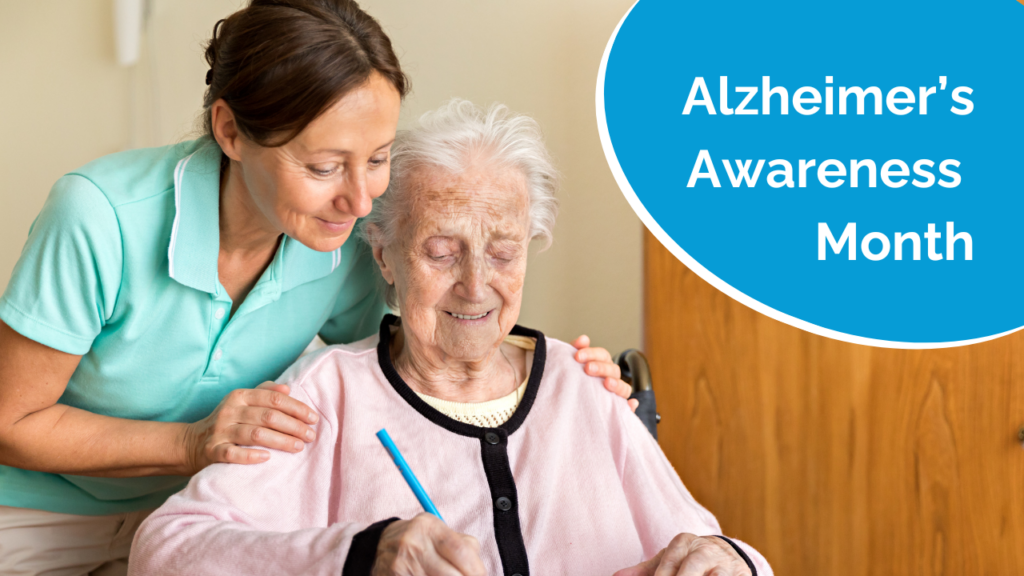January is Alzheimer’s Awareness Month

In January, Canada observes Alzheimer’s Awareness Month to help educate the public about the disease and fight the stigma associated with those diagnosed with Alzheimer’s.
What is Alzheimer’s Disease?
Alzheimer’s Disease is a form of dementia that primarily affects individuals over 65 years old. It is marked by the progressive destruction of brain cells, impacting individuals’ cognitive abilities and memory. While not the only form of dementia that affects older adults, it is the most common.
Experts have estimated that 1.7 million Canadians will be living with a form of dementia such as Alzheimer’s by 2050, making research and care a top priority for Canadian healthcare organizations and long-term care homes.
Common Symptoms of Alzheimer’s Disease
The Alzheimer’s Society suggests that the most common signs and symptoms of Alzheimer’s include:
- Accelerated memory loss that affects one’s day-to-day activities
- Difficulty doing typical or familiar tasks
- Forgetting words
- Disorientation or forgetting the time and place
- Impaired judgement
- Problems with abstract thinking
- Misplacing things
- Changes in mood, personality, and behaviour
- Loss of initiative and interest in common activities
- Challenges with vision, spatial information, and depth perception
Prevention and Care
There is no cure for Alzheimer’s currently, through researchers around the world are working on finding one., There are medications presently available, however, which have been shown to help alleviate symptoms and improve quality of life in individuals diagnosed with Alzheimer’s.
It’s not entirely clear what causes Alzheimer’s, but Canadians can reduce their risk of Alzheimer’s by being socially, physically, and mentally active. Keeping your body and brain active and challenged can help reduce the risk of depression, social isolation, diabetes, high blood pressure and high cholesterol – all of which can contribute to dementia risk. The Alzheimer’s Society also recommends taking steps to manage your stress, eat a healthy diet and make safe choices regarding your body and mind, to reduce your dementia risk. Although Alzheimer’s disease has a genetic component, genetics is not necessarily a cause of Alzheimer’s and having a close family member with Alzheimer’s is not indicative of whether an individual will have it too.
It is important to keep adults with Alzheimer’s physically and mentally active, as well as socially active in their communities as much as possible, to help them stay connected and improve their health outcomes.
How Can I Support Myself or Someone I Know with Alzheimer’s?
If you or someone you know has Alzheimer’s, understand that it can be a challenging time, but you are not alone. Check out the resources put together by the Alzheimer’s Society of B.C. for more information about Alzheimer’s disease. Stigma prevents people with Alzheimer’s, as well as their caregivers, from getting the support they need, so consider sharing what you’ve learned about Alzheimer’s to help break down barriers and reduce misinformation.
You can also check out Route65.ca’s navigator tool[MO1] to help you find suitable options for individuals living with Alzheimer’s, including long-term care, assisted living and home health.
Please note the Alzheimer’s Society of B.C. will be also hosting free webinars throughout the month that aim to educate Canadians about reducing your risk of Alzheimer’s, communicating with someone with Alzheimer’s, and living life to the fullest if you are diagnosed with Alzheimer’s.
Sources:
Alzheimer’s disease in Canada: Stats, resources and impact on Canadians | Healthing.ca
Alzheimer’s Awareness Month | Alzheimer Society of British Columbia
Leading causes of death, total population, by age group (statcan.gc.ca)
The 10 warning signs of dementia | Alzheimer Society of Canada
Brain-healthy tips to reduce your risk of dementia | Alzheimer Society of Canada
